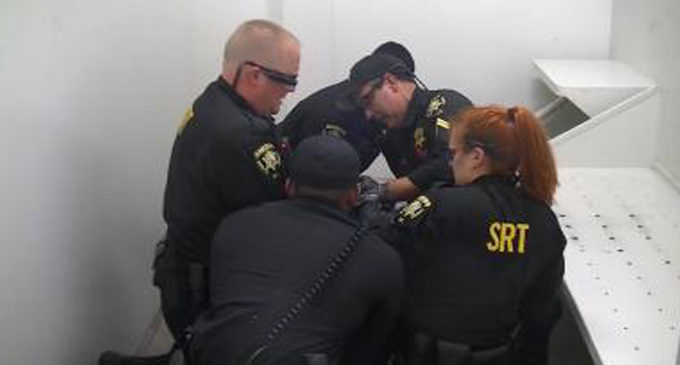FCSO makes policy changes, prone restraint continues that led to death of John Neville

Since the death of John Neville, the Forsyth County Sheriff’s Office (FCSO) has made several policy changes, but the prone restraint that led to Neville’s death has not been banned.
According to Major Robert Slater, FCSO detention bureau commander, there have been several changes to the department’s Use of Force policy since Neville died from asphyxia after he was restrained by five officers while using the prone restraint and basically left hogtied, lying face down on a mattress.
Around 3:24 a.m. on Dec. 2, 2019, Neville suffered a seizure while he was asleep and fell from the top bunk in his cell onto the concrete floor. After seeing him lying on the floor shaking as if he was having a seizure, Neville’s cellmate pushed a panic button and shortly after that, detention officers and the on-call nurse arrived. They found Neville “disoriented and confused” and decided to move Neville into an observation cell so the on-duty nurse could determine what was wrong.
While he was in the observation cell, officers used a prone restraint to try to get Neville to calm down. As he was being restrained by officers, Neville told officers “Help me” and “I can’t breathe” more than 50 times. In response, officers tell Neville to relax. At one point, one officer can be heard saying, “If you can talk, you can breathe,” and at another point, “You can breathe because you’re talking, you’re yelling and you’re moving.” At some point, the key to remove the handcuffs breaks and an officer requests bolt cutters as Neville’s voice begins to fade.
It takes officers more than 10 minutes to get bolt cutters to work, all the while five officers are restraining Neville face down. Before leaving the cell, officers handcuffed Neville’s hands behind his back and connected to shackles on his ankles.
A few minutes later the nurse, who was watching Neville from outside the cell, let officers know that Neville wasn’t breathing and they return to the cell to remove the handcuffs and perform CPR.
Neville died the next day at Wake Forest Baptist Medical Center. The autopsy conducted by Dr. Patrick Lantz of Wake Forest Baptist Medical Center shows Neville died from “complications of Hypoxic-Ischemic brain injury due to cardiopulmonary arrest due to positional and compressional asphyxia” sustained while he was in the “prone restraint.”
Since body camera footage showing what happened that night in the Forsyth County Jail, hundreds have called for the immediate ban of the prone restraint. Over the years in big cities and small towns across the country, many deaths have occurred due to the use of the prone restraint. Despite advice from medical experts about the dangers of the prone restraint, it still is widely used across the country.
When discussing changes made to the prone restraint, Slater noted the FCSO has made changes to how individuals are handled after being restrained, but it has not been banned. “Resisting individuals who must be placed in a prone or face down position to be subdued, must be repositioned to an upright sitting position or on their side as soon as restraining devices (handcuffs) are applied,” Slater said. He also mentioned officers have been instructed to only use the bent leg technique or any other physical hold that puts pressure on an individual’s limbs, back, chest or neck, as a “temporary measure to gain an individual’s compliance.” Slater said there has also been a new section added to the Use of Force Policy on Duty to Intervene, and all staff has completed training on positional asphyxia.
“That’s for the Use of Force Policy office-wide for the Sheriff’s Office,” Slater said. “So that policy not only covers the detention center, but it also covers the officers on the street.”
Sarah Poole, Cpl. Edward Roussel, Lovette Williams, Christopher Stamper, Antonio Woodley and Michelle Heughins, the five officers and the on-call nurse that night, have been charged with involuntary manslaughter in connection to the death of John Neville and will appear in court. But demands for the immediate outlawing of the prone restraint and justice for John Neville and countless other people of color who have died while in custody of law enforcement continues.









